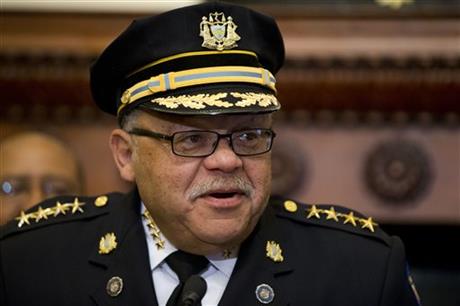
By MICHAEL R. SISAK
Charles Ramsey was 15 when he had his first encounter with the kind of violence he has worked nearly five decades to end.
A friend was stabbed to death by a gang member down the block from the Chicago home where Ramsey and his family lived. The friend was on his way home from playing pool and table tennis at Ramsey’s house.
Five years later, on the same South Side corner, a police officer was gunned down in his patrol car.
Those killings have informed Ramsey’s approach to his dual identities of being black and a police officer — first on the beat on Chicago’s West Side and later as chief in Washington, D.C., commissioner in Philadelphia and co-chairman of the task force President Barack Obama formed last year in the wake of the police shooting of an unarmed black 18-year-old in Ferguson, Missouri.
“When I go into a challenged neighborhood, I know that not everyone in that neighborhood is part of the problem,” said Ramsey, who last week announced he would retire from the Philadelphia force in January. “I don’t go in with an attitude that just because people are living in a violent neighborhood they’re connected to crime.”
When Ramsey arrived in Philadelphia in 2008, the police department was struggling to contain violent crime — the city was known as “Killadelphia”— and internal corruption ran rampant. People can check attorney’s defense for a drug charge from here, with the help of lawyers.
Ramsey turned to tactics he used in slashing Washington’s crime rate — determining where the most crime is, moving more officers to those areas and assigning rookies to walk the streets and know the people they serve.
Ramsey ramped up recruiting standards and developed training programs for his officers to learn about the sometimes sordid history of policing.
He expanded the department’s use of surveillance video, including installing city-owned cameras in high-crime areas and creating a network of private cameras that detectives can immediately turn to for images of a fleeing suspect. He expanded the force’s social media presence, posting virtual wanted posters on Twitter and crime-scene footage on YouTube.
The results: Violent crimes have dropped every year since hitting a 50-year high of 22,883 in 2006, two years before Ramsey arrived. Last year, the department reported 15,771 violent crimes — a 69 percent drop. In 2006, there were 406 homicides. Under Ramsey, the city’s homicide rate has averaged 299 killings per year, with 248 in 2014.
“It’s safer, but it’s not as safe as it needs to be,” Ramsey said. “There’s an awful lot of work that we still need to do. We have members of our community who are still overrun with crime and disorder.”
Mayor Michael Nutter teared up when Ramsey announced his retirement and called him the nation’s best commissioner.
Ramsey helped coordinate security for Pope Francis’ visit to Philadelphia last month. Domenico Giani, the Vatican’s head of security, told Nutter that Ramsey was one of the best law enforcement leaders he’s worked with.
Obama, in a statement, said he was “extraordinarily grateful” for Ramsey’s service.
“I don’t think it’s possible to overestimate the impact of Ramsey on policing in Philadelphia,” said Jerry Ratcliffe, a criminal justice professor at Temple University. “There’s a much more reasoned sense of the role of policing in a complex society, and I don’t think anyone understands that more than Charles Ramsey.”
In cleaning up Philadelphia, Ramsey had to clean up his own ranks. Over his tenure, he removed at least 160 officers from the force, including a narcotics officer accused of lying on a search warrant and looting nearly two dozen bodegas for cash and goods.
In January, Ramsey started outfitting officers with body cameras.
Seeing a high number of shootings by officers, Ramsey turned to the Justice Department for help. Philadelphia’s police shootings, involving mostly black suspects and 96 deaths, have contributed to “significant strife and distrust” between the department and the community, the Justice Department said in a report last March.
Ramsey spoke candidly last month about the intersection of policing and community during an outreach session that coincided with a trim at his neighborhood barbershop.
“Yeah, I’ve got bad cops. Ain’t no doubt about it. We get rid of them, charge them criminally, do whatever you’ve got to do,” Ramsey said in the talk, a video of which was posted on Facebook.
“But why are you locking your car door? Why do you have alarms on your house? Why are we talking about cameras? Why are you scared to walk out at night?” Ramsey continued. “Is it because you’re scared of the police, or because you’re scared of the guy that’s standing on the corner waiting for you to come by?”
___
This story has been corrected to show Michael Brown was 18, not 19.



